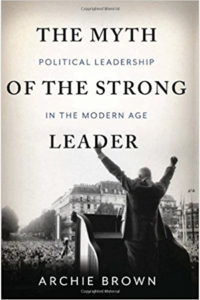The Myth of the Strong Leader: Political Leadership in the Modern Age
by Archie Brown
 Brown’s core argument is that a strong leader–one who dominates subordinates and the policy-making process– s not necessarily a good one. Rather, an effective and transformational leader is one who uses collaboration, persuasion, and consensus among subordinates in order to set policy and provide a direction forward.
Brown’s core argument is that a strong leader–one who dominates subordinates and the policy-making process– s not necessarily a good one. Rather, an effective and transformational leader is one who uses collaboration, persuasion, and consensus among subordinates in order to set policy and provide a direction forward.
While The Myth of the Strong Leader focuses on political leadership, the cooperative leadership qualities identified by Brown can be applied in any setting:
- Create the vision;
- Implement the vision through effective teams which have bought into the goals set as well as the process in getting there;
- Know both your subject matter and the people in your sphere;
- Use power and persuasion in calculated ways;
- Listen to outside expert advice (i.e., do not come to believe you know best on all accounts);
- Court those who oppose you (although that may mean overlooking some of their worst faults); and
- Do not quash the minority for the will of the majority.
Brown concludes that people are more secure under leaders who take the necessary time to come to informed decisions about how to react in complex situations compared to those who act swiftly, thinking they know more than they really do.
Brown, Archie. The myth of the strong leader: Political leadership in the modern age. Basic Books (AZ), 2014.

Recent Comments